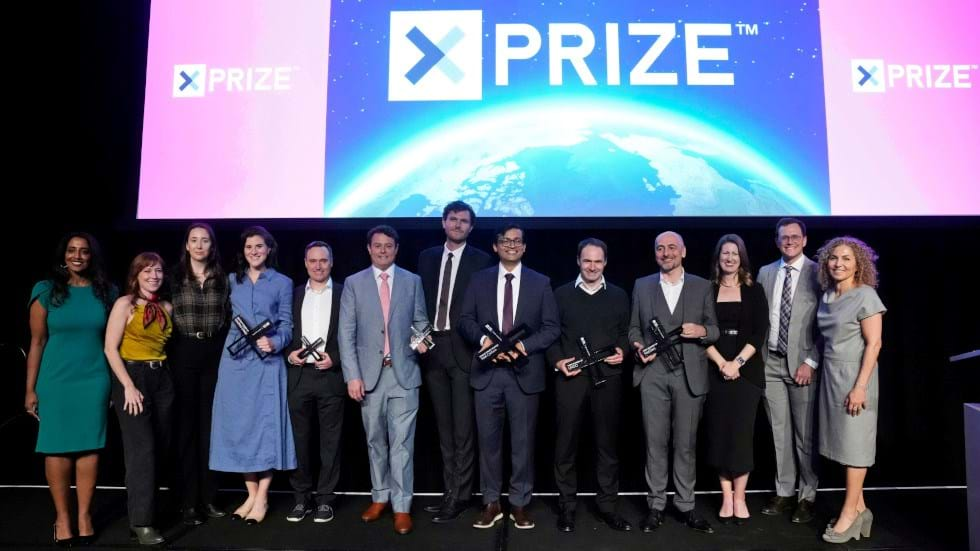Soil-boosting tech wins US$50m XPRIZE for sucking CO2 from the air

A US$50m prize for developing technology that removes CO2 from the atmosphere and oceans has been won by Mati Carbon. Their free crushed rock helps smallholder farmers in Africa and India grow more crops from their soil.
Mati Carbon overcame more than 1,300 teams from 88 countries to win the XPRIZE Carbon Removal competition. The remaining half of the US$100m prize was shared among runners-up and student teams.
“We cannot stabilise our climate without sustainably and safely extracting carbon from our atmosphere and oceans at large scales,” said Anousheh Ansari, CEO of the XPRIZE.
The UN Intergovernmental Panel on Climate Change (IPCC) has said large-scale deployment of CO2 removal (CDR) technologies is unavoidable if net zero targets are to be achieved.
Ansari added: “At this critical turning point for our planet, the technologies developed by these winning teams represent hope with a broad range of approaches that are suitable for different geographies and can help the world reach net zero and ultimately reverse climate change.”
Paydirt for rock weathering
Mati Carbon’s removal solution hinges on the natural process of rock weathering. It applies pulverised basalt to the soil of smallholder farmers. As the basalt weathers, it absorbs CO2 from the atmosphere, and the weathering process releases nutrients from the rock which remineralise the soil. This works as an alternative fertiliser for farmers who may not have ready access to or cannot afford synthetic fertilisers. Mati Carbon says adding crushed basalt, which it provides free of charge, increases the average crop yield by 20%, boosting income for farmers.
It is funding the work by selling carbon credits to companies including H&M and Shopify which use them to offset their own emissions.
Shantanu Agarwal, CEO of Mati Carbon, said: “Being named the grand prize winner of XPRIZE Carbon Removal is not just a validation of our approach to CDR, it also represents a major catalyst to building out the science and infrastructure needed to deliver on our mission – generating climate resilience and economic empowerment for the more than 100 million smallholder farmers in developing economies worldwide.
“I am very proud of our Mati Carbon team and the thousands of smallholder farmers who have partnered with us in India, Tanzania and Zambia.”
Showing it works
To show that the technology works, the company measures how much carbon is removed from the fields in which its basalt is applied. This includes analysing soil using inductively coupled plasma mass spectrometry to detect small shifts in elemental concentrations. Its monitoring, reporting and verification framework was developed in partnership with Yale University and the Indian Institute of Technology Kanpur.
The CO2 absorbed into the soil goes through a series of chemical reactions resulting in dissolved bicarbonate which percolates into streams and then down into aquifers or out into the ocean where Mati estimates it will be stably stored for more than 10,000 years.
Last year, XPRIZE selected 20 finalists and challenged them to demonstrate their technologies at the kilotonne scale, model their costs at the megatonne scale and chart how they could scale sustainably to the gigatonne scale.
The competition’s runners-up were NetZero whose biochar technology, which is also added to the soil to absorb carbon and improve soil health, won US$15m. Vaulted was awarded US$8m for its technology that repurposes organic waste – such as papermill sludge and manure – which would otherwise be burned or left to emit methane. Instead, the waste is injected deep underground using established oil and gas techniques. Another rock weathering method from Undo won US$5m.
The competition is funded by Elon Musk whose foundation launched the prize in 2021. It followed in the footsteps of the £20m (US$26.5m) NRG COSIA Carbon XPRIZE which was launched to incentivise companies to develop technologies that use captured CO2 to make products. The winners were CarbonCure and CarbonBuilt who produce concrete using injected CO2.
A report published last year by XPRIZE found that investments in carbon capture, carbon conversion, and carbon removal technologies on the increase with investment shifting away from early stage innovations towards project deployment and scaling.
Questions have been raised about the trustworthiness of carbon credits. Last year, the UK’s Parliamentary Office of Science and Technology (POST) published a report on carbon offsetting noting that the purchase of credits is unregulated and that businesses need guidance on what activities it is appropriate to offset.
Recent Editions
Catch up on the latest news, views and jobs from The Chemical Engineer. Below are the four latest issues. View a wider selection of the archive from within the Magazine section of this site.




